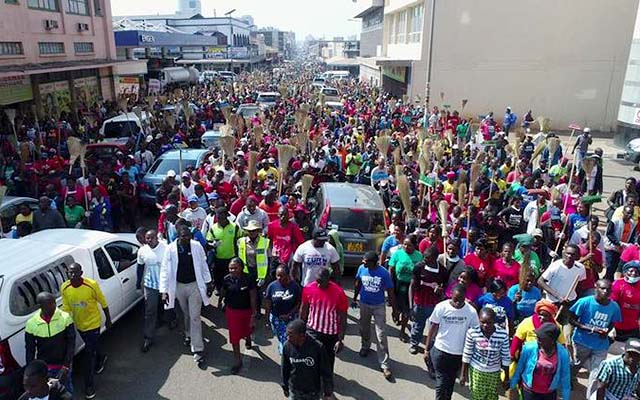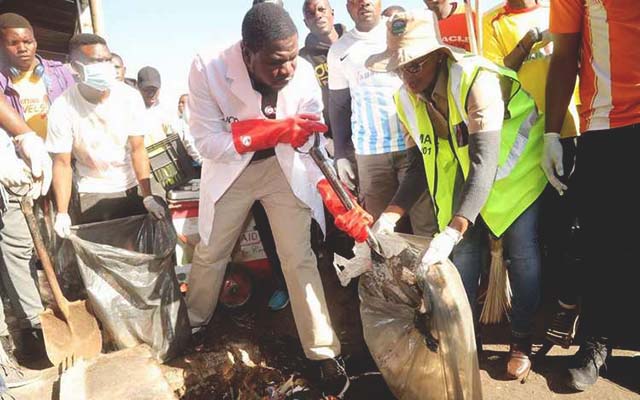Role of churches in keeping cities clean . . . . PHD Ministries to hold clean-up campaign tomorrow

Churches are joining the fight to keep the city clean and are playing an important role in Harare’s waste management
Roselyne Sachiti Features Editor
Harare’s central business district and Mbare Musika are a carnival of activity. Littered with illegal vendors, pirate taxis, touts, kombis and long distance buses, going there is like walking a tight rope in a tornado. Navigating these parts of Harare is both fascinating and adrenalin pumping, but upsetting for those concerned about the environment.
If in the CBD, one has to be extra cautious to avoid stepping on tomatoes sold on pavements by illegal vendors. It is also always wise to constantly watch out for illegal pirate taxi’s known as mushika shika as they navigate their way on any open space, pavements included.
Second, it is easy to get bumped into by the huge human mass found in this area. Garbage that includes green vegetables, cabbages, maize husks peeled off by customers who do not want to carry litter home, plastic, glass and paper waste stubbornly return each time streets are cleaned.
Sometimes the sight is unpleasant and bins provided by corporates in an effort to minimise waste seem to have lost the war and are simply ignored or vandalised. The skip bins in the CBD have not helped either as the amount of rubbish churned out daily is too much especially at Copacabana which has high human traffic.
Then there are the notorious “street children” who in their rascal moments empty bins onto the pavements, creating more mess for the city fathers, who in their offices at Town House are busy trying to shape Harare into a world class city by 2025.
While many organisations have held clean-up campaigns, churches too, are joining the fight and playing an important role in Harare’s waste management. Tomorrow, PHD Ministries founder Walter Magaya will lead an estimated 50 000 congregants to sweep and pick up litter from Harare’s streets in the CBD.
Other delegates from countries such as China, Botswana, the UK, Swaziland and South Africa attending the church’s Business Seminar and Leadership Conference, which kicked off yesterday and ends on Sunday February 4, will also participate in the clean-up exercise. Prophet Magaya said in a way to help curb diseases like cholera and typhoid, his church holds clean-up campaigns four times a year.
“We also clean the environs of our church. I do not believe people should use land as a bin. I preach against people who do not clean the environment and appreciate what they have. As a church, we always do our best to take care of the environment and use it wisely, instead of poisoning or destroying it.
“After creating Adam, the first man, the Bible says, ‘The Lord God took the man and put him in the Garden of Eden to work it and take care of it’ (Genesis 2:15). God didn’t tell him to exploit the world or treat it recklessly, but to watch over it and use it wisely,” explained Prophet Magaya.
He said they would clean up starting from the Seke Road flyover, Seventh Street, the Mbare Flyover, NSSA (Selous Avenue/Sam Nujoma Street) among others into the CBD.
“We have plenty brooms but we have urged our congregants to also bring theirs. Those who do not attend our church but are passionate about a clean environment can also join us; keeping our city clean is everyone’s responsibility,” he added.
He said as they sweep, they will also spread the word to pedestrians and motorists.
“To show how serious I am about environmental management, I will be sweeping from 9 am when we begin the clean-up campaign up to 12pm when we finish,” he said.
Environmental Management Agency (EMA) spokesman Mr Steady Kangata said the church plays a significant role in waste management and welcomed PHD and other churches’ initiatives.
“Church leaders raise anti-litter awareness to their congregants because of the influence they have. They can conduct clean-up campaigns and spearhead recycling initiatives. Churches can donate bins to their local authorities and also adopt zones for care and maintenance.
Other churches such as SDA have a strong environmental movement; Anglican church has a green church movement whilst others such as the United Methodist normally invite EMA for environmental talks during their stewardship months where the stewardship of the environment is key,” he said.
He added that EMA as the environment watchdog, works with 25 stakeholder groups, churches included, to tackle various environmental issues.
“We have engaged the Zimbabwe Council of Churches, Union for the Development of African Churches in Zimbabwe Africa (UDACIZA), Evangelical Fellowship of Zimbabwe and the Zimbabwe Catholic Bishops Conference which all fall under the Zimbabwe Heads of Christian Denominations.
“We understand that the church is a place where moral values are instilled into people, hence we believe that the leaders of such denominations, if they appreciate environmental issues, can preach the same gospel to their congregants. The result is a community which values the cleanliness of their surroundings, therefore they will not litter,” he said.
Mr Kangata said Zimbabwe’s urban areas had a huge waste management challenge as they churned out a lot of refuse each year. A survey done in 2011 by EMA in conjunction with the Institute of Environmental Studies revealed that Zimbabwe’s urban centres generate 1,65 million tonnes of waste per annum.
He added that per month residential areas generate 614,840 tonnes, commercial areas 485,716 tonnes, industry 442,839 tonnes, medical 34,136 tonnes and academic institutions 72,027 tonnes.
In the same survey, overall urban centres generated 530,746 tonnes of biodegradable solid waste in 2011, which made up the largest component (32 percent) of the generated waste. This was followed by paper 407,207 tonnes or 25 percent; plastic 303,040 tonnes, (18 percent); metal 108,624 tonnes, (seven percent) and textile 100,865 tonnes, (six percent).
The rest of the components (medical, glass, electronic, rubble and other) each contributed less than five percent. Thus 90 percent of the solid waste was either reusable, recyclable or biodegradable. Mr Kangata said high density residential areas, by virtue of their population densities, market places and bus termini, were some of the hot spots in waste management.
He said residential areas discard waste in the form of food left overs, empty cans, plastic waste and diapers. Industry disposes rubble from construction projects and scrap metal, workers lunch-time refuse. Found in public places is waste paper, empty containers. Sources include motorists tossing garbage through windows, and at entertainment events.
“To be precise, Mbare Musika, which comprises both the bus terminus and the market areas, needs more attention. To address this challenge, we need to put our heads together and ensure that everyone plays their part towards attaining a clean environment. Incorporating the Rs which are reduce, reuse, recycle and recover from the waste management hierarchy, is key in tackling the waste management challenge.
“Waste is a resource and hence should be viewed as such. We need to move away from the current scenario where we generate waste, collect then dispose but rather be guided by the waste management hierarchy.
“The backbone of all this is waste separation at source. This will reduce the amount of waste destined for Pomona (Harare’s main dump site). Correspondingly, the local authority should play its part in maintaining a consistent waste collection schedule that is known by residents. The waste should be disposed of in a properly engineered site,” he said.
He added that more waste receptacles should be availed at public places and collected regularly. There is also need for a mind-set shift in people so that they do not litter. Mr Kangata said one day clean-up campaigns were a good starting point. However, he added, they should be coupled with more sustainable waste management practices such as recycling and the church can play a leading role in this.
“Also, attitude change is key as it will guarantee that the area remains clean if people do not litter. Furthermore, waste management should be taken as a business where citizens derive cash from waste,” he said.
Mr Kangata encouraged churches to form community-based organisations (CBOs) and health clubs which can venture into waste management projects, generate money for members and alleviate poverty. City of Harare Spokesman Mr Micheal Chideme said churches play an advocacy role in waste management.
“They should also join in and do clean-ups. The dirt you see is caused by people; why not — before church services, members also clean up the 100-metre radius of their place of congregation? The mindset should hate litter, litter management is an everyday thing,” he said.
The United Nations Sustainable Development Goal 11 emphasises making cities inclusive, safe, resilient and sustainable. To this end, the City of Harare has adopted a strategy dubbed Sustainable Clean City project which entails education, community participation and community policing.
Mr Chideme added that the sustainable city concept was slowly gaining traction but more still needed to be done to win the minds and hearts of the people to accept they need to stay in a clean environment. The Bible states that a righteous man cares for the needs of his animals and the environment.









Comments